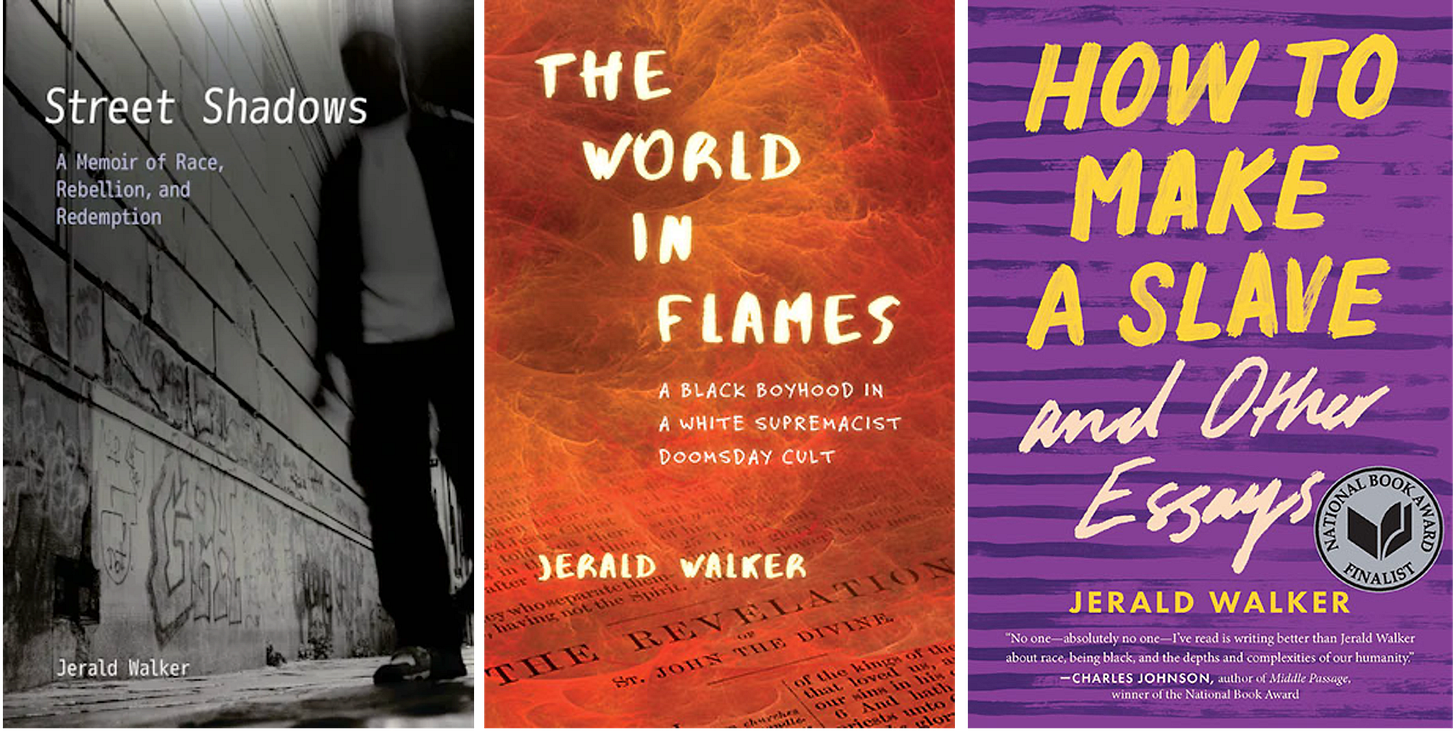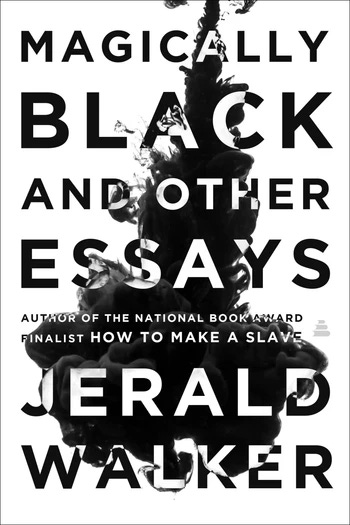Jerald Walker is the author, most recently, of Magically Black and Other Essays (Amistad, 2024), which includes “It’s Hard Out Here for a Memoirist,” originally published in Prairie Schooner and reprinted in The Best American Essays 2024. Walker’s previous books are: How to Make a Slave (Mad Creek Books, 2020), finalist for the National Book Award; The World in Flames: A Black Boyhood in a White Supremacist Doomsday Cult (Beacon Press, 2016); and Street Shadows: A Memoir of Race, Rebellion, and Redemption (Bantam Books, 2010). His many awards and honors include a PEN/New England Award for Nonfiction, the Massachusetts Book Award, and fellowships from the Guggenheim Foundation and the National Endowment for the Arts. His work has appeared in many literary journals and magazines. Walker is a Distinguished Professor of Creative Writing and African American Literature at Emerson College. His work has been reprinted in the Best American Essays series six times since 2007.
Listen to Jerald Walker read the first three minutes of “It’s Hard Out Here for a Memoirist” (in Magically Black and Other Essays, 2024), originally published in Prairie Schooner in 2023 and appearing in The Best American Essays 2024.
Interview
CP: You're among the record holders whose work has been published multiple times in The Best American Essays, with six essays reprinted since 2007. Can you recall the experience of your first time to now? What's changed?
JW: The first essay [“Dragon Slayers”] I’d ever gotten published in a literary magazine made it into Best American Essays. I was stunned. It changed the whole trajectory of my writing career, which up to that point I’d thought would be in writing fiction. The second time it happened, I was surprised. The third time I was surprised, but a little less so. Now my goal is to always be in Best American Essays.
CP: What has your experience of publishing in periodical literature been?
JW: I didn’t get published until I started submitting personal essays to literary magazines, which is something [my wife,] Brenda, urged me to do. I’ve had good success getting published in literary magazines.
CP: How would you characterize each of your works, and their relationship to one another, if any?
JW: My first book [Street Shadows] is a memoir, my second is a memoir [The World In Flames], my third is a collection of personal essays [How to Make a Slave] with some pieces that are fifteen to twenty years old. My fourth book [Magically Black] is another collection, and I wanted it to be as innovative as possible. It shares similar themes as my other books, but I wanted to experiment more with craft. In How to Make a Slave, one way I did that was by writing five essays in second person. In Magically Black, I wrote one of the essays in a choose-your-own-adventure style; another is composed of mostly footnotes.
CP: How did the process of writing Magically Black differ from the process of writing How to Make a Slave? I read that it took fifteen years to write How to Make a Slave.
JW: How to Make a Slave is a compilation of essays I’d written over a couple of decades, so the topics vary. In contrast, I was more intentional in the curation of Magically Black. In other words, I wrote these essays over three years specifically for this book.
CP: In Magically Black, we encounter a narrator who is a Chicagoan, a writer, a reformed thug, a romance reader, a son, all part of a narrator learning to gracefully lean into his domesticity. What have the elder years both brought and taught you?
JW: My elder years have brought me an increasing concern of the welfare of my sons and trying to make sure they can prosper in my absence. I’m constantly asking, have I done a good job raising them? What impact will I have left? My next collection will likely focus even more on fatherhood.
“In terms of revealing personal secrets, most nonfiction writers have a line beyond which they will not cross. That line, however, is usually etched in pencil, as there may come a time—for any number of reasons—to lift the ban on a secret or two. But secrets are secrets for a reason; their disclosure could cause irreparable harm.”
CP: In Magically Black, you spoil us with glimpses of your dynamic with your wife, Brenda. What inspired you to be more liberal with her as a character in these essays? Also, what keeps your relationship so healthy despite being so different from one another?
JW: Brenda is the hero of the book. She plays a central role in the text because she plays a central role in my life. She’s a great spouse and keeps me levelheaded, really balances me out. Our relationship is so healthy because we like each other, even when we make mistakes, which I’m prone to do. Even when I overreact to situations that I think she doesn’t react strongly enough to, we still love each other. We’ll be married for thirty years in May.
CP: How do you, as a memoirist, decipher when to use or hold your best-kept secrets, such as that of Thelma Elsworth in "It's Hard Out Here for a Memoirist?" Is there an anxiety that you've either used material too soon or waited too long?
JW: In terms of revealing personal secrets, most nonfiction writers have a line beyond which they will not cross. That line, however, is usually etched in pencil, as there may come a time—for any number of reasons—to lift the ban on a secret or two. But secrets are secrets for a reason; their disclosure could cause irreparable harm. I’m not interested in irreparably harming myself, and so, with regards to “It’s Hard Out Here for a Memoirist,” if I had been an actual pimp in the manner of, say, Iceberg Slim, the world would never know it. It’s perhaps worth nothing that Iceberg Slim said he wrote Pimp: The Story of My Life as a plea for men to forgo that deplorable profession. He would have us believe, in other words, that his memoir was a kind of public service announcement, one that just so happened to make millions of dollars.
I have an anxiety about a lot of things as a writer, but the timing of when to use material isn’t one of them. That said, I prefer to mull over would-be material for a good long while, sometimes for years. In that way by the time I’m ready to convert it to an essay, I have a good sense of its possibilities.
CP: "Good Help" is a standout piece because it’s so funny, but I appreciate that you depicted the humor and, therefore, the grace you and Brenda exhibited to the contractor. How do you remain empathetic and optimistic in your dealings with racism?
JW: Racism can be hurtful, but it is often harmless. If you’re going to be sensitive to every racially motivated thing somebody says, you’re going to spend a lot of time hurt and upset. Also, the racism I encounter today is so vastly different from that of my teens and early twenties. Back then, it was so overt that what I encounter today is sometimes funny in contrast. Also, there’s victory in laughing it off, as it removes the power from the racist in question. I like to have fun at their expense.
“I want readers to expand their definitions of blackness, to see the various ways that Black identities can be inhabited and shaped, be it through cinema, church, or any variety of cultural practices. But mostly, I want readers to see the heroism and resilience that characterize the Black race.”
CP: As I read Magically Black, I sensed an increasing tension between whether or not to bring your past life with you or leave it to dull/blur your new life.
JW: As of now, the life I left in Chicago, that part of me, has slowly faded, to the degree that I am a bit uncomfortable when I do return to my old neighborhoods. I’m a suburbanite now. I live in a safe neighborhood, but I still have flashbacks from my life in Chicago, so I’ve brought it with me, and I think it’s that tension, that friction between my two vastly different lived experiences, that makes the essays successful.
CP: I enjoyed Magically Black’s use of pop culture as a character. What prompted this choice?
JW: Many of the publishers who rejected How to Make a Slave felt that the essays were too personal. They encouraged me to use pop culture to make it more universal and therefore have a broader appeal, so I thought I’d give that advice a try.
CP: What should readers take away from Magically Black as a whole?
JW: I want readers to expand their definitions of blackness, to see the various ways that Black identities can be inhabited and shaped, be it through cinema, church, or any variety of cultural practices. But mostly, I want readers to see the heroism and resilience that characterize the Black race.
“Read fiction, as much as you can, in order to pick up narrative techniques. Be as honest as possible. The heart of nonfiction is honesty.”
CP: What are your writing habits like? What is your creative process?
JW: I write every day. I write in the morning because back when my children were young, it was the only time I had to myself before they were up. I've kept this practice, so I write every day from six to nine am. I don’t do anything else until my writing is done. When I sit down to write, I often don’t know where the essay will go. If I can’t figure it out, I put it away and come back to it at a later time. When I find that I’m staring at a blank page for too long, I give myself word counts as a goal; 500 words need to be written in three hours. I find that even if 90 percent of what I write doesn’t work, there’s at least 10 percent that’s good and enough to continue with.
CP: What do you like to read/ what are you currently reading?
JW: I like to read fiction. I’m currently reading The Bee Sting by Paul Murray.
CP: What advice do you have for up-and-coming essayists?
JW: Read fiction, as much as you can, in order to pick up narrative techniques. Be as honest as possible. The heart of nonfiction is honesty.

See also:
Interview with Jerald Walker in The Guardian, September 10, 2024.
“The Suspension of Belief: On Being a Practitioner and Teacher of the Essay in the Age of Skepticism,” Welcome Table Press, Occasional Papers on the Essay: Practice & Form, 2010
An interview with Jerald Walker in Creative Nonfiction, Jenelle Pifer, Fall 2010
“It’s Hard Out Here for a Memoirist,” Prairie Schooner. 97.1. 2023 (reprinted in The Best American Essays 2024)
"Breathe," New England Review. 40.3. 2019 (reprinted in The Best American Essays 2020)
"How to Make a Slave," Southern Humanities Review. 2014 (reprinted in The Best American Essays 2015)
"Unprepared," Harvard Review. 2011 (reprinted in The Best American Essays 2012)
"The Mechanics of Being,"The Missouri Review. 2009 (reprinted in The Best American Essays 2010).
"Dragon Slayers," The Iowa Review. 2007 (reprinted in The Best American Essays 2008).
Cheyenne Paterson is an editorial assistant with The Best American Essays. An aspiring writer and editor, she is studying publishing and writing at Emerson College and working as an editorial coordinator at Harvard Business Review Press.





